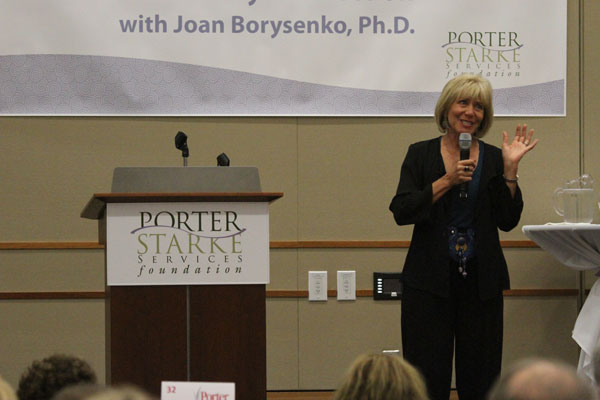 “You have a thought and it affects everything in your body,” shared noted scientist, researcher, and author Joan Borysenko at the 3rd Annual Living Health, Balance & Hope Symposium held by Porter-Starke Services on May 24, 2012. Borysenko spoke on the connection between the mind and the body and the impact state of mind has on overall health.
“You have a thought and it affects everything in your body,” shared noted scientist, researcher, and author Joan Borysenko at the 3rd Annual Living Health, Balance & Hope Symposium held by Porter-Starke Services on May 24, 2012. Borysenko spoke on the connection between the mind and the body and the impact state of mind has on overall health.
“No one ever said, ‘Just last Tuesday, you were completely crazy,’” laughed Borysenko, sharing her own battle with mental illness at age 10. As a result of her struggles, Joan developed an interest in neurobiology and psychology, and the reasoning behind how a sane person can seemingly overnight develop a mental illness. “Everything in our body changes with what we perceive in our environment,” she stated, “My mind affects my body and your mind affects my body. And vice versa.”
Borysenko went on to share stories of the mind’s powerful effect on the body, including soldiers experiencing no pain when receiving placebo painkillers, and victims of domestic violence changing their behavior by changing their mindset, taking the blame off of themselves. “It’s not about fixing or changing someone but starting a journey of discovery in a most respectful way,” she shared, when discussing the role of outside help on a person’s mindset. “We are the medicine for one another.”
 A little TLC helps to reduce IL-6, molecules made by white blood cells that create inflammation in the body. Inflammation is good if you are fighting a virus or bacteria, but bad if continues, as the inflammation will often lead to chronic illnesses such as heart disease and diabetes. Love acts as an antagonist to stress; it stimulates the pleasure system, enhances motivate and positive choice-making, decreases anxiety and depression, increases wellbeing and decreases physical symptoms. “One’s view of your place in the universe makes all the difference.”
A little TLC helps to reduce IL-6, molecules made by white blood cells that create inflammation in the body. Inflammation is good if you are fighting a virus or bacteria, but bad if continues, as the inflammation will often lead to chronic illnesses such as heart disease and diabetes. Love acts as an antagonist to stress; it stimulates the pleasure system, enhances motivate and positive choice-making, decreases anxiety and depression, increases wellbeing and decreases physical symptoms. “One’s view of your place in the universe makes all the difference.”
“Development of compassionate presence is simple but not easy,” Borysenko went on to say. Compassionate presence is a nonjudgmental awareness of the moment; it’s what remains when stress is removed, the root of enlightened social action and healing. The development is fostered by the charity we give to one another, the way we interact with each other. When we make a conscious effort to be compassionate towards others, we in turn foster our own wellbeing. “Happiness is not dependent on something happening or not; it comes from inside you.”
Borysenko ended the morning presentation discussing inner peace for busy people, a common trait in the workplace today. Sharing a quote from Thomas Merton, “There is a pervasive form of contemporary violence- activism and overwork. The rush and pressure of modern life are a form, perhaps the most common form, of its innate violence…it destroys our own inner capacity for peace,” Borysenko stressed the importance of recognizing burnout and how to overcome it.

Visit Porter Starke on Facebook
Visit the Porter Starke Website
601 Wall St
Valparaiso, IN 46383
Phone: 219-531-3500
There are 12 stages of descent to burnout, which don’t necessarily occur in the order presented but are common signs that a fallout is on its way and action needs to be taken. The stages are:
- Stage 1: Driven by an Ideal
- Stage 2: Working like a Maniac
- Stage 3: Putting Own Needs Last
- Stage 4: Miserable and Clueless as to Why
- Stage 5: Death of Values
- Stage 6: Frustrated, Aggressive, and Cynical
- Stage 7: Emotionally Exhausted and Disengaged
- Stage 8: Destructive Self-Comfort
- Stage 9: Isolation
- Stage 10: Inner Emptiness
- Stage 11: Who Cares and Why Bother?
- Stage 12: Physical and Mental Collapse
When reaching any of the above stages, we “have to put things aside and go away for a few days…you can’t keep doing this.” Take the time to revive, rest, and recover.
